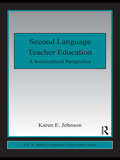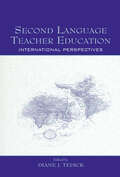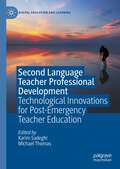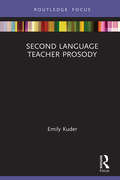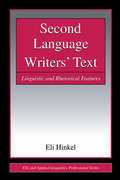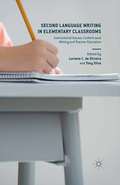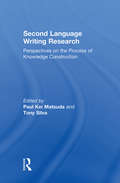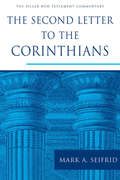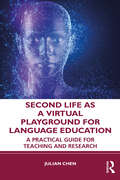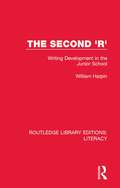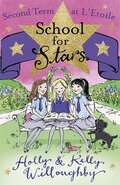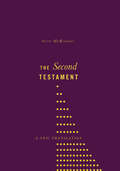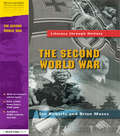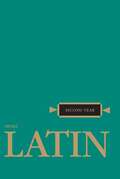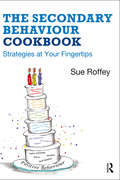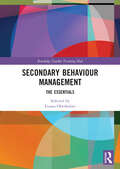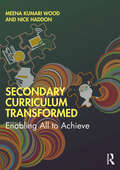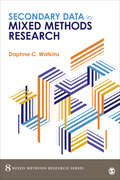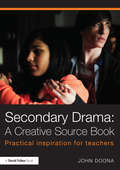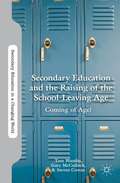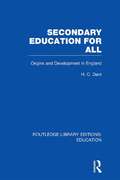- Table View
- List View
Second Language Teacher Education: A Sociocultural Perspective (ESL & Applied Linguistics Professional Series)
by Karen JohnsonThis book presents a comprehensive overview of the epistemological underpinnings of a sociocultural perspective on human learning and addresses in detail what this perspective has to offer the field of second language teacher education. Captured through five changing points of view, it argues that a sociocultural perspective on human learning changes the way we think about how teachers learn to teach, how teachers think about language, how teachers teach second languages, the broader social, cultural, and historical macro-structures that are ever present and ever changing in the second language teaching profession, and what constitutes second language teacher professional development. Overall, it clearly and accessibly makes the case that a sociocultural perspective on human learning reorients how the field understands and supports the professional development of second language teachers.
Second Language Teacher Education: International Perspectives
by Diane J. TedickThe education of second language teachers takes place across diverse contexts, levels, settings, and geographic regions. By bringing together research, theory, and best practices from a variety of contexts (ESL/EFL, foreign language, bilingual and immersion education), this book contributes to building meaningful professional dialogue among second-language teacher educators. Featuring an international roster of authors, the volume is comprised of 18 chapters organized in four thematic sections: the knowledge base of second language teacher education; second language teacher education contexts; collaborations in second language teacher education; and second language teacher education in practice. Second Language Teacher Education: International Perspectives is an essential professional resource for practicing and prospective second language teacher educators around the world.
Second Language Teacher Professional Development: Technological Innovations for Post-Emergency Teacher Education (Digital Education and Learning)
by Karim Sadeghi Michael ThomasThis edited book brings together documented evidence and theoretical propositions on the essential mediating role of digital technology in L2 teacher education and professional development. Topics range from technological affordances in teacher education, to challenges and responses to emergency transition from face to face to virtual professional development, to successful practices of online teacher training courses. Bringing together examples from various countries and contexts of how L2 teacher trainers and trainee teachers view these forced changes and react to them, the volume fills a gap in the use of digital technology in contexts where teacher educators and trainee teachers are not technology-literate and not prepared for technology-oriented education. In addition to a Foreword by Mark Warschauer and Introduction and Conclusion chapters by Editors, the volume features 13 full-length chapters by some of the well-known experts from countries such as Australia, Finland, Mexico, the UK, the USA, Spain, Singapore, Turkey and Sweden.
Second Language Teacher Prosody
by Emily KuderSecond Language Teacher Prosody focuses on the prosodic characteristics of input in L2 Spanish classrooms. Readers are led through descriptions and interpretations of prosodic behaviors based upon teachers’ training and experience, their native or near-native speaker status, and their own comments about their teaching. The analysis culminates with several key discoveries and methodological implications with regard to didactic prosody, research design and methodology, and data interpretation. The conclusion offers future lines of research on SDS prosody including reception studies exploring the relative salience and effectiveness of prosodic cues. Educators can intentionally utilize these tools to achieve pedagogical goals. This book will be of interest to scholars in Applied Linguistics and Instructed Second Language Acquisition.
Second Language Writers' Text: Linguistic and Rhetorical Features (ESL & Applied Linguistics Professional Series)
by Eli HinkelThis comprehensive and detailed analysis of second language writers' text identifies explicitly and quantifiably where their text differs from that of native speakers of English. The book is based on the results of a large-scale study of university-level native-speaker and non-native-speaker essays written in response to six prompts. Specifically, the research investigates the frequencies of uses of 68 linguistic (syntactic and lexical) and rhetorical features in essays written by advanced non-native speakers compared with those in the essays of native speakers enrolled in first-year composition courses. The selection of features for inclusion in this analysis is based on their textual functions and meanings, as identified in earlier research on English language grammar and lexis. Such analysis is valuable because it can inform the teaching of grammar and lexis, as well as discourse, and serve as a basis for second language curriculum and course design; and provide valuable insight for second language pedagogical applications of the study's findings.
Second Language Writing in Elementary Classrooms: Instructional Issues, Content-area Writing and Teacher Education
by Luciana C. de OliveiraSecond Language Writing in Elementary Classrooms focuses on L2 writing in elementary classrooms. It features chapters that highlight research in elementary classrooms focused on the writing development of multilingual children, and research in teacher education to prepare elementary teachers to teach L2 writing and address L2 writers' needs.
Second Language Writing in Elementary Classrooms: Instructional Issues, Content-area Writing and Teacher Education
by Luciana C. de Oliveira Tony SilvaSecond Language Writing in Elementary Classrooms.
Second Language Writing Research: Perspectives on the Process of Knowledge Construction
by Paul Kei Matsuda Tony SilvaIn this original volume, eighteen researchers from different parts of the world reflect on their own research projects, providing insights into key methodological issues in research on second language writing. By offering a glimpse into the process of constructing and negotiating knowledge in the field--the messy space of situated practices of inquiry--it helps to demystify the research process, which can appear in published studies and in introductory methodology guides to be neater and more orderly than it actually is.Taking a broad conception of research as inquiry that emphasizes the situated and constructed nature of knowledge in the field, Second Language Writing Research: Perspectives on the Process of Knowledge Construction encourages multiple forms of inquiry, including philosophical, narrative, and historical modes. Empirical inquiry as presented in this book encompasses both quantitative and qualitative approaches as well as those that strategically combine them. A helpful discussion of the "nuts and bolts" of developing sustainable research programs is also provided. The volume as a whole facilitates a situated, issue-driven research practice. Its unique focus on second language writing research makes it an invaluable resource for both novice and experienced researchers in the field.
The Second Letter to the Corinthians (The Pillar New Testament Commentary (PNTC))
by Mark A. SeifridNewest volume in the acclaimed Pillar New Testament Commentary series The question that Paul set before the ancient church in Corinth -- Do you not recognize that Jesus Christ is in and among you? (2 Cor 13:5) -- remains a critical question for the church today. This commentary by Mark Seifrid seeks to hear Paul’s message afresh and communicate it to our time. Seifrid offers a unified reading of 2 Corinthians, which has often been regarded as a composite of excerpts and fragments. He argues that Paul’s message is directed at the “practical atheism” of the Corinthian church -- the hidden heresy that assumes God’s saving work in the world may be measured by outward standards of success and achievement. Like all of the Pillar volumes, Seifrid’s commentary on 2 Corinthians offers careful grammatical analysis and exegesis with clear pastoral application.
Second Life as a Virtual Playground for Language Education: A Practical Guide for Teaching and Research
by Julian ChenThis insightful book offers language teachers and teachers in training the opportunity to delve into 3D virtual worlds and see the benefits they provide for effective language teaching. Based on a decade of experience teaching and researching in Second Life (SL), Chen demystifies the dos and don’ts of SL teaching and research, whilst vividly walking readers through each step of the journey. Written in an accessible, jargon-free, and personalised tone, the book is divided into three parts. Part I builds the foundation in SL research, task-based language teaching (TBLT), and understanding fundamental skills for SL teaching. Part II showcases the author’s SL teaching blog that generously unveils their task-based, SL-enabled lessons, participant observations, critical reflections, and lessons learned from each SL session. Part III is complete with the highlights of the author’s SL research and hands-on resources and tips for readers. Each chapter also features a "Checkpoint" section to gauge reader understanding of chapter content, followed by a "Your Task" section to promote learning by doing in SL. Teachers and curriculum designers will find the well-detailed and guided lesson planning useful when starting their first SL class. Graduate students and novice researchers will also find the systematically recorded data collection helpful for their SL research.
The Second 'R': Writing Development in the Junior School (Routledge Library Editions: Literacy #9)
by William Sydney HarpinOriginally published in 1976. How do children learn to write? What stages to they pass through in mastering this skill? What part can teachers play in aiding their development? These are some of the questions that this book sets out to answer. This book offers a perspective on writing which places children's language resources and their development at its centre. It discusses the purpose of writing, ways of classifying its variety, providing contexts for writing, its treatment in schools and methods for helping children to overcome difficulties. A section explores the arguments for a writing policy or programme in schools, and offering guidance on considerations that shape policy making.
Second Term at L'Etoile: Book 2 (School for Stars #2)
by Holly Willoughby Kelly WilloughbyThe second novel from the bestselling SCHOOL FOR STARS series written by celebrity sisters Holly and Kelly Willoughby. Catch up with Molly, Maria and Pippa as they return for their second term at the all-singing, all-dancing L'Etoile school.Christmas break is over and the three friends are reunited as they begin their second term at L'Etoile, the exclusive School for Stars. Little do they know what fun and surprises lay in store for them. A midnight mystery, a precious lost rose, centenary celebrations, a playful puppy with a twinkle in its eyes, and a royal visit are just some of the things that make them friends for ever.This book is GLEE for 9+ and is perfect for fans of BALLET SHOES and MALLORY TOWERS.
The Second Testament: A New Translation
by Scot McKnightExperience the New Testament afresh in Scot McKnight's bold translation. Typical translations of the New Testament make the biblical text as accessible as possible by using the language of our own day. At times this masks the distance between the New Testament text and modern readers. Scripture continues to speak to us but it speaks as an ancient text to the modern world. New Testament scholar Scot McKnight offers a translation of the New Testament with a daring approach to the ancient text. Clever in its expression and at times stunning in its boldness, The Second Testament will challenge readers to experience God's Word anew. God blesses the beggars in spirit because theirs is Heavens’ Empire. God blesses the grievers because they will be consoled. God blesses the meek because they will inherit the land. God blesses the ones hungering and thirsting for the rightness because they will be satisfied. (Matthew 5:3-6) Features include: Complete text of the New Testament Brief introductions to each book Maps of key locations and events Glossary of key terms in the translation Full-cloth hardcover with foil stamping
The Second World War: The Second World War
by Ian Roberts Brian MosesThis book will support children as they: * Find out about wartime phrases and use them to write a dialogue * Write a letter home from a P.O.W. camp * Read wartime adverts and slogans and decide how effective they are
Second Year Latin
by Robert J. HenleThe backbone of Henle Latin Second Year is intensive language study, including review of the first year plus new materials. Separated into four parts, Henle Latin Second Year includes readings from Caesar's Commentaries, extensive exercises, and Latin-English vocabularies. Humanistic insight and linguistic training are the goals of the Henle Latin Series from Loyola Press, an integrated four-year Latin course. Time-tested and teacher endorsed, this comprehensive program is designed to lead the student systematcially through the fundamentals of the language itself and on to an appreciation of selected classic texts.
The Secondary Behaviour Cookbook: Strategies at Your Fingertips
by Sue RoffeyDeveloped in conjunction with teachers, The Secondary Behaviour Cookbook provides highly effective, practical strategies for responding to and resolving behavioural issues in secondary schools. Consisting of over fifty ‘recipes’, the book’s unique format enables teachers and practitioners to quickly and easily access information and advice on dealing with specific behaviours. Each ‘recipe’ details strategies and interventions for immediate application in the classroom setting, considers possible causes of the given behaviour, and offers helpful approaches for responding to young people’s needs in the longer term. From disorganization and lateness, to attention-seeking and destructive behaviours, bullying, anxiety and depression, the book’s sections cover a broad spectrum of behaviours falling within six broad categories: Getting Things Done: supporting positive student engagement and achievement Dealing with Disruption: increasing motivation and skills to facilitate learning Social Interactions: resolving problematic situations that occur between pupils. Coping with Conflict: addressing conflict in and out of the classroom, including aspects of bullying and discrimination Emotional Distress: understanding distress and developing coping strategies Behaviours of Special Concern: recognising behaviours associated with autism, trauma, abuse or poor mental wellbeing. Underpinned by positive psychology, and emphasising the importance of constructive relationships, communication, inclusion, wellbeing and resilience, this is an indispensable resource for secondary school teachers and educators, behaviour support consultants, SENDCOs and educational psychologists.
Secondary Behaviour Management: The Essentials
by Lizana OberholzerThis concise book supplements the Routledge School Based Teacher Training Hub which you can find at www.routledgeteachertraining.comThe Hub has been developed in conjunction with teacher training experts and offers busy trainees and their mentors focussed, accessible, evidence-informed guidance that will help develop skills and confidence for successful classroom practice.The chapters in this collection on the Hub explore one of the most challenging aspects of learning to teach in the secondary school: Managing behaviour. The Hub provides:-Online access to ten chapters, carefully selected from across the breadth of Routledge's publishing, written by experts in the field, to cover core skills and knowledge for effective behaviour management.-An introduction to each chapter, designed to show how the evidence applies to your setting and practice, and how you can build on the advice to develop and improve teaching.-A self-audit test, to help you pinpoint gaps and understand where you will most benefit from skills and confidence development. -Observation sheets, offering a framework that will help you focus and reflect when you’re observing colleagues.-Short mentor meeting guides to structure initial and ongoing meetings with your mentor, to help you get the most out of these important relationships.
The Secondary Curriculum Leader's Handbook
by Roy BlatchfordAt a time of renewed focus on the schools curriculum, Roy Blatchford has brought together some of the sharpest thinkers in education in a brilliant mixture of both practical and conceptual essays about what makes for a positive secondary curriculum.Perfectly timed to reflect the new Ofsted framework, the contributions reflect a range of thinking, planning and delivery, as schools do it now and will for the future. It is a compendium of proven practice, offering tips to less experienced/adventurous middle and senior leaders.Featuring contributions from: Iain Veitch; Deborah Eyre; Stephen Rollett; David Birch; Melanie Saunders; Fran Haynes; Mary Myatt; Rebecca Clark; Nick Soar; Rachel Macfarlane; Ashley Robson; Jo Facer; Ed Vainker; Samuel Strickland; Simon Watson; Elizabeth Swan; Peter Hyman.
The Secondary Curriculum Leader's Handbook
by Roy BlatchfordAt a time of renewed focus on the schools curriculum, Roy Blatchford has brought together some of the sharpest thinkers in education in a brilliant mixture of both practical and conceptual essays about what makes for a positive secondary curriculum.Perfectly timed to reflect the new Ofsted framework, the contributions reflect a range of thinking, planning and delivery, as schools do it now and will for the future. It is a compendium of proven practice, offering tips to less experienced/adventurous middle and senior leaders.Featuring contributions from: Iain Veitch; Deborah Eyre; Stephen Rollett; David Birch; Melanie Saunders; Fran Haynes; Mary Myatt; Rebecca Clark; Nick Soar; Rachel Macfarlane; Ashley Robson; Jo Facer; Ed Vainker; Samuel Strickland; Simon Watson; Elizabeth Swan; Peter Hyman.
Secondary Curriculum Transformed: Enabling All to Achieve
by Meena Kumari Wood Nick HaddonMore than ever, secondary curriculum requires greater flexibility and adaptability so young people learn the relevant knowledge and key skills they need for the evolving world of training and employment. This practical guide, both radical and progressive, makes a compelling argument for a secondary curriculum that addresses the needs and aspirations of all students. A balanced approach will help reform students’ attitudes and behaviours and re-ignite their curiosity and motivation for learning. Secondary Curriculum Transformed proposes an ambitious GCSE five-year journey inclusive of academic, creative and technical subjects, including T-Levels and mandatory key skills. To equip young people with this critical knowledge and key skills, the book: transforms the 11–19 curriculum so it does not disadvantage, marginalise or exclude young people; showcases excellent practice case studies from British and international contexts; provides curriculum models which schools can adapt to their own context; signposts educational research and listens to the ‘student voice’; transforming them into leaders of their learning. Offering a comprehensive model for leaders and teachers to put the evidence into practice, this is essential reading for all education professionals. There are also additional templates, PowerPoints, useful links and other resources which can be downloaded from www.routledge.com/9780367900878. Offering a comprehensive model for leaders and teachers to put the evidence into practice, this is essential reading for all education professionals.
Secondary Data in Mixed Methods Research (Mixed Methods Research Series)
by Daphne C. WatkinsSecondary Data in Mixed Methods Research by Daphne C. Watkins, the latest contribution to the Mixed Methods Research Series, offers unique and necessary instruction in this growing topic. With the increasing amount of secondary data available through journals and repositories, researchers have a trove of sources for new investigations at their fingertips, but few books to guide them. This brief text provides readers with a step-by-step procedure for incorporating secondary data into various mixed methods research designs, as well as identifying key characteristics of existing datasets that make them good candidates for mixed methods projects and giving ideas for new uses of secondary data. Introductory chapters help the reader understand the “what” and “why” of secondary data. Subsequent chapters address the use of secondary data in convergent, exploratory sequential, explanatory sequential, and other complex research designs. The final chapters delve into writing and reporting on projects before, during, and after the project. Quotes throughout the chapter help readers remember key bits of knowledge, while learning objectives and summaries in each chapter structure the reading experience. Application questions at the end of each chapter help readers recall information and apply it to their own research projects. By emphasizing how to use existing qualitative and quantitative datasets in mixed methods research, Secondary Data in Mixed Methods Research will help readers answer new and ongoing questions in social science research.
Secondary Data in Mixed Methods Research (Mixed Methods Research Series)
by Daphne C. WatkinsSecondary Data in Mixed Methods Research by Daphne C. Watkins, the latest contribution to the Mixed Methods Research Series, offers unique and necessary instruction in this growing topic. With the increasing amount of secondary data available through journals and repositories, researchers have a trove of sources for new investigations at their fingertips, but few books to guide them. This brief text provides readers with a step-by-step procedure for incorporating secondary data into various mixed methods research designs, as well as identifying key characteristics of existing datasets that make them good candidates for mixed methods projects and giving ideas for new uses of secondary data. Introductory chapters help the reader understand the “what” and “why” of secondary data. Subsequent chapters address the use of secondary data in convergent, exploratory sequential, explanatory sequential, and other complex research designs. The final chapters delve into writing and reporting on projects before, during, and after the project. Quotes throughout the chapter help readers remember key bits of knowledge, while learning objectives and summaries in each chapter structure the reading experience. Application questions at the end of each chapter help readers recall information and apply it to their own research projects. By emphasizing how to use existing qualitative and quantitative datasets in mixed methods research, Secondary Data in Mixed Methods Research will help readers answer new and ongoing questions in social science research.
Secondary Drama: Practical inspiration for teachers
by John DoonaJohn Doona is an artist and a teacher of exceptional quality. He brings both artistic and human integrity to a wide range of drama work from the classroom to performance of the highest standards. His significant practice is firmly rooted in principle and knowledge of drama and children and young people. I recommend him to you as an exceptional and effective teacher and practitioner. Professor Jonothan Neelands, University of Warwick, UK What is a compelling scheme of work and how do I create one? What are the building blocks of Drama? How do I sustain interest and engagement? What is the purpose and impact of my daily work? Providing inspiration for daily practice alongside a full range of tried and tested schemes of work, this exciting new book offers support to secondary teachers wanting to create original drama experiences to meet their own unique classroom needs. The book models a positive and reflective approach to classroom practice offering a thoughtful exploration of the craft and art of drama teaching covering key issues such as classroom management, student engagement, planning, progression and assessment. After considering the theory behind drama in education and the fundamentals of practice, the majority of the text is devoted to the annotated schemes of work. These cover a diverse range of topics such as homelessness, addiction, terrorism and civil rights and show how the ideas discussed can be put into practice. Featuring a Preface by Dorothy Heathcote and a Foreword by Edward Bond, this resource will be valuable reading for both new and established teachers looking to deliver excellent inspiring drama lessons across the secondary setting and become a vibrant and effective drama specialist.
Secondary Education And The Raising Of The School-leaving Age
by Tom Woodin Gary Mcculloch Steven CowanThe progressive raising of the school-leaving age has had momentous repercussions for our understanding of childhood and youth, for secondary education, and for social and educational inequality. This book assesses secondary education and the raising of the school-leaving age in the UK and places issues and debates in an international context.
Secondary Education for All: Origins and Development in England (Routledge Library Editions: Education)
by H C DentThe Education Act of 1944 launched an unprecedented experiment in the history of education in the UK. This book is a brief survey of the routes by which compulsory free secondary education was arrived at, as well as an examination of the position in 1949 and suggestions for the future.
